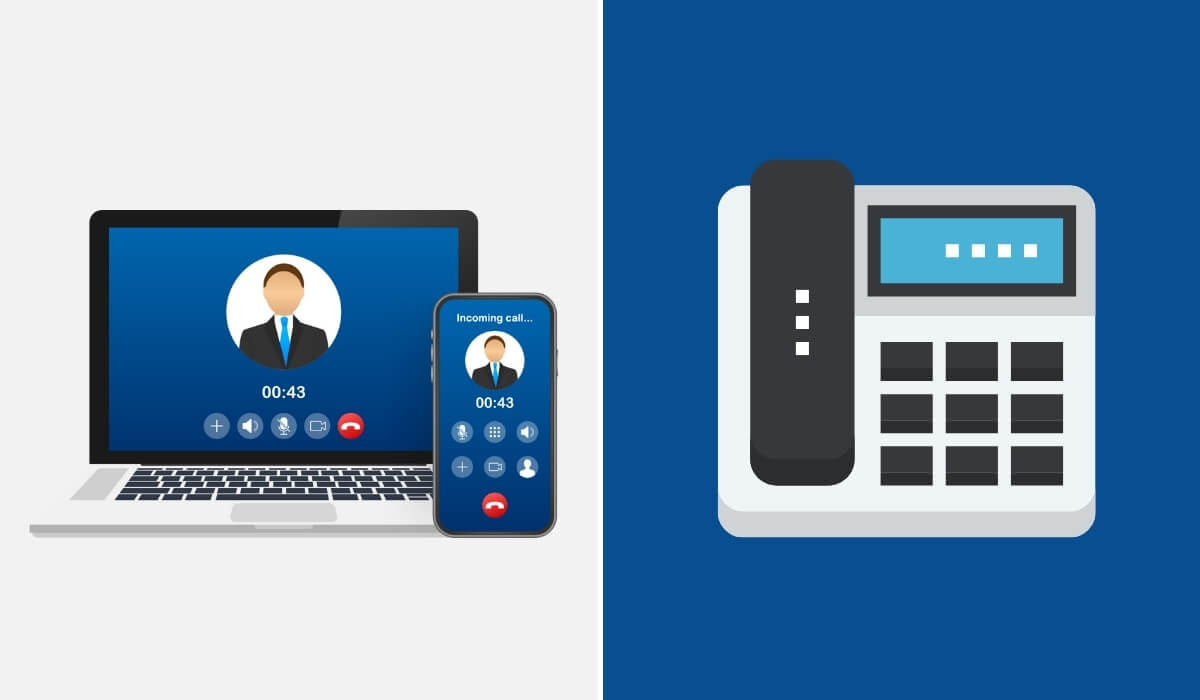Table of Contents
The possibilities for small business phone systems seem to be endless. Retailers promote a variety of phones that support multiple lines. Two-line business phones, touch phones, and cordless phones are all available. Even dual-sim mobile phones are already available.
Two-line phones recognize activity for each phone line and can determine how to direct even simultaneous incoming calls. It is feasible to utilize two phone lines without having to buy a two-line telephone; however, you will need to either modify your existing wall jacks or acquire a two-line splitter.
Splitters connect to a normal one-line jack and divide the line, sending the first line to one jack and the second line to the other. After installation, you will have two single-line phones connected to the same socket.
A multi-line phone system functions similarly to a conventional one-line phone in that audio data packets are sent to the receiver via telephone lines. When you set up a two-line phone system, the transmission of two, four, or more lines is possible. A cordless extension also allows you to connect another phone to a multi-line phone system (or phones).
This article will assist you in selecting the most appropriate multi-line phone system for your requirements. So, how do you set up a two-line phone system?
Let’s find out!
How To Set Up a Two-line Phone System for Your Small Business

A multi-line phone operates in the same way as a regular phone, with the exception that it has been specifically built to accommodate two lines. This implies that two phones connected to the same telephone line may be able to simultaneously receive and make calls.
Multi-line systems enable one person to take many critical calls at the same time or allow someone to filter calls before forwarding them to an executive for further review and consideration.
A small business phone system may already have been of use to you. It simply transmits audio information between users who are on different ends of the phone line and vice versa.
As your company develops, multi-line and two-line phone systems may become more adaptable to the types of communication you need to be successful. Setting up a phone system is easier than ever for businesses. It is economical, too.
A multi-line system makes it possible for several individuals to make phone calls at the same time. It is compatible with two, four, or more phone line system configurations, regardless of whether the lines are internally or externally connected.
Customer service is critical to building a positive connection with your firm and the individuals who work there. Installing a dependable multi-line business phone system makes this possible. These phones make it simpler to communicate in the workplace, resulting in improved productivity.
According to a recent study, 95% of respondents think customer service is critical to their decision to purchase a product or service and to their continued loyalty. The ability to react to incoming calls as soon as possible is an important element of providing excellent customer service.
How To Determine Which Two-line Phone System Is Right for Your Business

Nowadays, multi-line phone systems for companies are equipped with a variety of functions. Some features may be provided as part of the package you buy. Others, which are more sophisticated, may need to be bought separately as add-ons.
A short description of the typical features is provided below. Evaluate your existing requirements and which features would simplify communication and increase productivity for your employees before making this significant purchase.
Caller Identification
Caller identification allows you to see who is calling. You may select between two options: caller ID, which just shows the caller’s phone number; or caller ID with name, which displays both the caller’s phone number and the caller’s first and last name. When used correctly, this feature may assist in determining which calls are essential and which are spam.
When you need to be hands-free while on the phone, or when you’re in the midst of a meeting and need to call someone in, using a speakerphone may be very useful.
Callers may leave you a message if you do not answer the phone or if you are not available to take their call.
An LED light that flashes to indicate that you have gotten new voicemails will notify you when you have received new messages. It is often included with the phone, although it may also be purchased as a stand-alone answering machine.
Mute and Volume Control
These choices allow you to mute, raise, or reduce the volume of your speakerphone, phone audio, or ringer, just as they do with other audio devices.
Hold
The ability to place a call on hold varies depending on the phone system you buy. Some small business phone systems play hold music (or you may record your personalized message); others just put a call on wait without doing anything else.
Telephone Call Transferring
This function enables you to transfer calls inside the workplace to another employee or outside the office to an external phone number.
All Page/Intercom
The all-page/intercom function enables you to talk to all phones at the same time via the speakerphone. The intercom feature allows you to broadcast announcements or notify other workers that a call is awaiting their attention on the intercom system.
Do Not Disturb
Do Not Disturb puts all incoming calls to voicemail without the phone ever ringing. When you’re in a critical meeting or unable to answer the phone, this function may be very useful.
Callers are greeted by the auto attendant, who then gives them a directory of extension numbers. This is a more sophisticated function that may or may not be available with your phone system package.
Texting
Texting services, another sophisticated feature, make use of your current landline number to deliver text messages to clients’ mobile phones. Texting services are becoming more popular.
Purchasing A Multi-Line System
If you are considering the purchase of a multi-line phone system, you should first decide why you believe the system would be a good fit for your needs and what particular features you need from the system.
A multi-line phone system is a fantastic option if:
- you want to provide every one of your workers with a dedicated phone number and if you have a large number of employees.
- you get a large number of incoming calls, and you have workers that make many outbound calls.
- you want to allocate particular numbers to specific departments or individuals inside your organization.
You should also give serious thought to whether you want or need actual phone lines in your office space. Voice over Internet Protocol, often known as VoIP, is becoming more prevalent in the corporate telephone industry and might make physical phones less necessary in your business.
The Differences Between VoIP and Landline Systems for Your Small Business

Voice-over-internet-protocol (VoIP) is a method of transmitting voice data across a network of cable, fiber, or digital subscriber lines (DSL). It requires an internet connection as well as electrical power.
An analog telephone system is dependent on copper wires. It is not necessary to have electricity or internet access to receive calls on a landline.
Pros of VoIP Phone Systems
Less Expensive Alternative
VoIP saves businesses a considerable amount of money on their telephone expenses, from the initial setup through the ongoing calling charges. They also have the option of being answered via a headset or mobile device rather than a costly desk phone, which saves money.
Feature-Rich
Call transferring, auto-attendant, and voicemail-to-text are just a few of the functions available on VoIP phones, all of which are simple to set up. Using them, your business may do more with your phone system than is feasible with a traditional landline phone system.
In the event of a natural catastrophe rendering your workplace uninhabitable, you may still answer your VoIP phones from any location that still has electrical power, keeping your customers satisfied and your company operating. This system is both flexible and scalable: users may be added or removed with a few clicks, and you only pay for the resources you are using at any given time.
Cons of VoIP Phone Systems
You’ll Require a Dependable Internet Connection
VoIP phones depend on an internet connection. Without a stable internet connection, the quality of your calls will decrease. When your Wi-Fi goes down, your phone system will go down with it, so be prepared.
Power is essential
If you use VoIP, you must have access to steady electrical power. Even though calls may be routed to mobile phones when power outages occur, this is not recommended.
Learning Curve
When moving from a traditional landline system to a more flexible VoIP system with additional capabilities, your staff will experience a small learning curve, as they would with any new technology. Connect2Geek provides VoIP training to ensure that everyone gets up and running quickly.
Pros of Landline Phone Systems
Not affected by power outages
Power outages do not affect older phones that are still plugged into a landline socket. These phones will get a signal even when electrical power is interrupted. However, most business phones, even older ones, are powered by electricity, so this is only a “positive” if you have a backup phone that is not powered by electricity to use in the case of a power outage.
Not Reliant on the Internet
Because it is not reliant on the internet, if your internet connection goes down, your landline phone system will not be affected. In addition, you will not experience lag time or poor call quality as a result of a bad internet connection.
Some companies in remote or mountainous areas may not yet have access to the high-speed internet connections required for high-quality VoIP service.
Great Audio Quality
Landline technology has been around for a long time and provides excellent call quality. You won’t have to worry about static (unless there’s a faulty cable connection) or poor call quality when using a landline phone.
Cons of Landline Phone Systems
It’s more expensive than before
Compared to VoIP, the cost of installing and expanding a traditional landline system is much greater. Dialing overseas is also more costly due to the higher cost of international calls. Some VoIP providers advertise that their long-distance rates are up to 80 percent less expensive than those of traditional phone plans.
Lacks flexibility and scalability
If you are expanding your workforce, it may be costly to install more phone lines to accommodate additional phones. If you decide to scale down at a later date, it will be more difficult to decrease your landline expenses.
Perhaps landlines will not be supported in the future.
According to the National Regulatory Research Institute, as many as 41 states have either decreased or discontinued their oversight of wired telecommunications. This action implies that copper line service may be phased out soon.
How Many Phone Lines Does Your Company Require?

Some factors should be considered when small businesses make choices about multi-line phone systems and the number of phone lines your company requires.
2-line Phones
Although they are not recommended for larger organizations, two-line phone systems may be excellent for small companies of various types. For example, if you have a small company that you operate from your house or a home-based firm with just a few numbers, a two-line phone system may be an excellent choice for you.
4-line Phones
If you are the owner of a company that is somewhat larger than a solopreneur, you may need a 4-line phone system to communicate with your customers.
A four-line phone may be required if you are responsible for managing a small number of people who work full-time or part-time and who all need simultaneous access to a phone line at some point.
For example, you may need to buy a 4-line phone if you own an insurance company with a small number of workers.
5+ line Phones
If you own a company that employs a small number of full-time workers, you may need to purchase a 5+ line phone. For example, if you operate a telemarketing business with three or more workers, a phone system with at least five lines is more likely to accommodate your needs.
Keep these questions in mind when you’re contemplating how many phone lines to carry:
- What exactly do I mean by a “business line”? Is it possible that my definition of “business line” may alter in the future?
- Will I need more (or fewer) lines over the next six months? Or 12 months? How about five years?
- What is the structure of my business? Will I need a system capable of handling a call center? Or do I want a straightforward approach for a small office?
- What is my financial situation? What is the maximum amount of money I am prepared to spend?
- What aspects of the client experience are essential to my company?
Cost of VoIP and Landline Systems

Landline phone system plans typically cost an average of $42.00 per line per month for the first line, with each additional phone line costing an extra $25.00 per month, on average. These plans often offer unlimited local calling only and do not include international calling.
In most cases, long-distance and international calls are not included in basic landline plans. They may cost up to $0.12/minute for long-distance calls and up to $0.39/minute for international calls.
Even while some VoIP phone service providers may only give a certain number of minutes per month as part of their monthly plans, the overwhelming majority provide free unlimited calling inside the United States and Canada as part of their monthly plans.
As a result, VoIP clients save money on local, long-distance, and interstate phone calls, and only pay for international minutes, which are not included in the package price.
International calling rates will vary depending on the region. However, many VoIP companies allow customers to buy a certain number of international minutes per month for a fixed price per minute. On average, VoIP subscriptions cost between $20.00 and $40.00 per user each month, with many plans including an unlimited number of phone extensions.
Since these plans are extremely scalable, the number of users you add will result in a reduced per-person average monthly cost. Some plans offer a fixed monthly cost for numerous users who are combined in groups of 5 to 10 employees.
Multi-line Phone System Experience

Modern business phones and the ways they bring office success are greater than ever before. When it comes to company phone systems, having several lines has several benefits, including helping you to promote yourself as a professional organization and making it simpler for workers to remain in touch with clients and one another.
Multi-line phone systems are also much more cost-effective than a conventional phone system by offering the flexibility needed to expand with your company’s growth.
Today’s two-line phones for small businesses offer more than just basic incoming and outgoing calls. Most systems include voice calls, video, text, email, media, and video conferencing, all from one place/dashboard that is easy to train employees to use and simple to operate.
Answers to the Most Commonly Asked Questions

Is a Multi-line Phone System the Same as a PBX Phone System?
No. Even though both systems perform comparable functions, a PBX system accepts calls via a centralized receiving area. This centralized reception area is computerized and automated. It provides callers with a menu of choices for whichever company department they want to contact.
Multi-line phone systems combine several phone lines into a single device that is answered by an operator who directs calls to the appropriate employee or department.
VoIP multi-line phone systems, do not require centralized human contact; PBX phone systems do.
What Is a Multi-line Phone System?
Phone systems, such as PBX and VoIP, are often mistaken as the same multi-line phone systems. However, each system works differently, so before buying a product, always study the actuality behind the lingo.
Consider a reception area in an office with a phone that accepts all incoming calls as an example of how multi-line phone systems may be broken down. A receptionist answers these calls and transfers them to the relevant department.
Customers who attempt to reach your company will be placed on hold rather than cut off since the reception phone can handle several calls at once.
How Many Phone Lines Do I Need for My Company?
This is completely dependent on your company’s requirements. For example, if you own a small company with just two workers but get a high number of inbound client calls, you should consider installing a multi-line phone system with four or more lines.
This is done so that when consumers call, they are not instantly cut off if both workers are already on the phone. One wonderful aspect of multi-line systems is that you may easily and somewhat inexpensively expand capacity by adding additional lines as your company develops.
What Is a Small Business Phone System?
A small business phone system is a Voice Over Internet Protocol (VoIP) telephony communication platform that makes and receives phone calls over the Internet rather than the traditional PSTN network. VoIP phones provide sophisticated capabilities such as visible voicemail, call recording, and call routing that conventional desk phones do not.
How Do I Go About Setting up a Small Business Phone System?
Setup for a typical small company VoIP phone system is surprisingly easy.
Depending on the supplier, you may be able to set up a basic phone system online in as little as 10 minutes.
Check network compatibility, choose a business phone number, calculate the number of users, and then download the softphone/mobile VoIP software.
You won’t need to connect a physical PBX box to your phone system if you’ve selected a fully cloud-based option. If you have an on-premises solution, connect your PBX box to your desk phones/computers via an Ethernet connection.
If you wish to handle the procedure on your own, providers offer step-by-step installation instructions via an online knowledge base.
For more complicated systems, you will almost certainly need customized installation and configuration assistance. The majority of VoIP providers include customized onboarding programs, user training webinars or custom courses, and onsite installation/setup.
The Bottom Line
Investing in a multi-line phone system can significantly enhance your business communication. These top-notch devices function much like tablets, complete with web browsing capabilities. However, for smaller companies with limited call needs, these high-end options might be excessive. On the other hand, simpler versions are not only more budget-friendly but also easier for employees to learn.
Ultimately, when choosing your phone system, it’s crucial to strike the right balance between your company’s needs and your budget, just as you would with any significant expense. If you’re interested in exploring some of the best multi-line phone systems tailored for small businesses, remember to check out our article!




